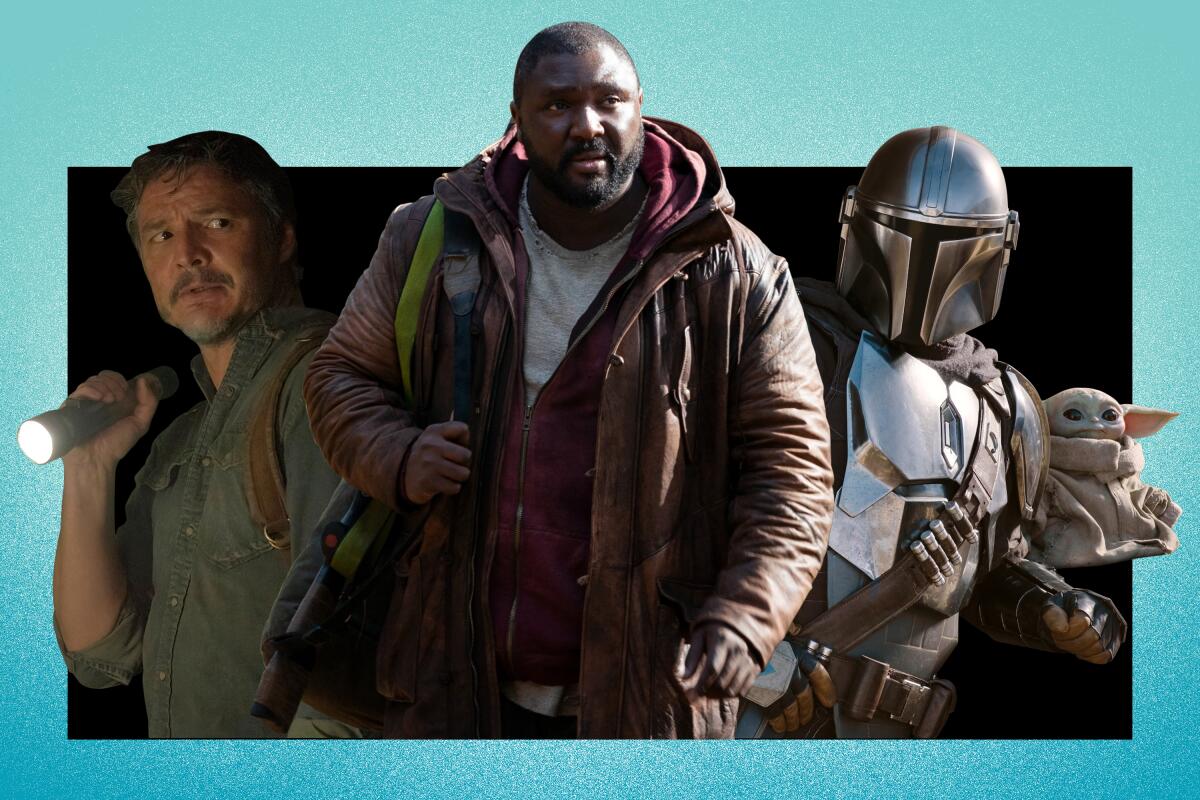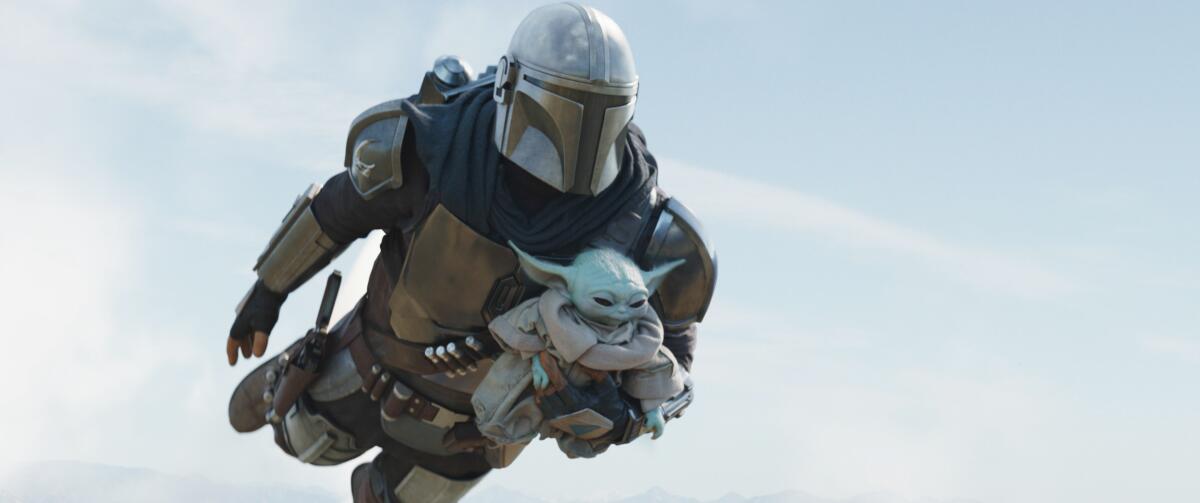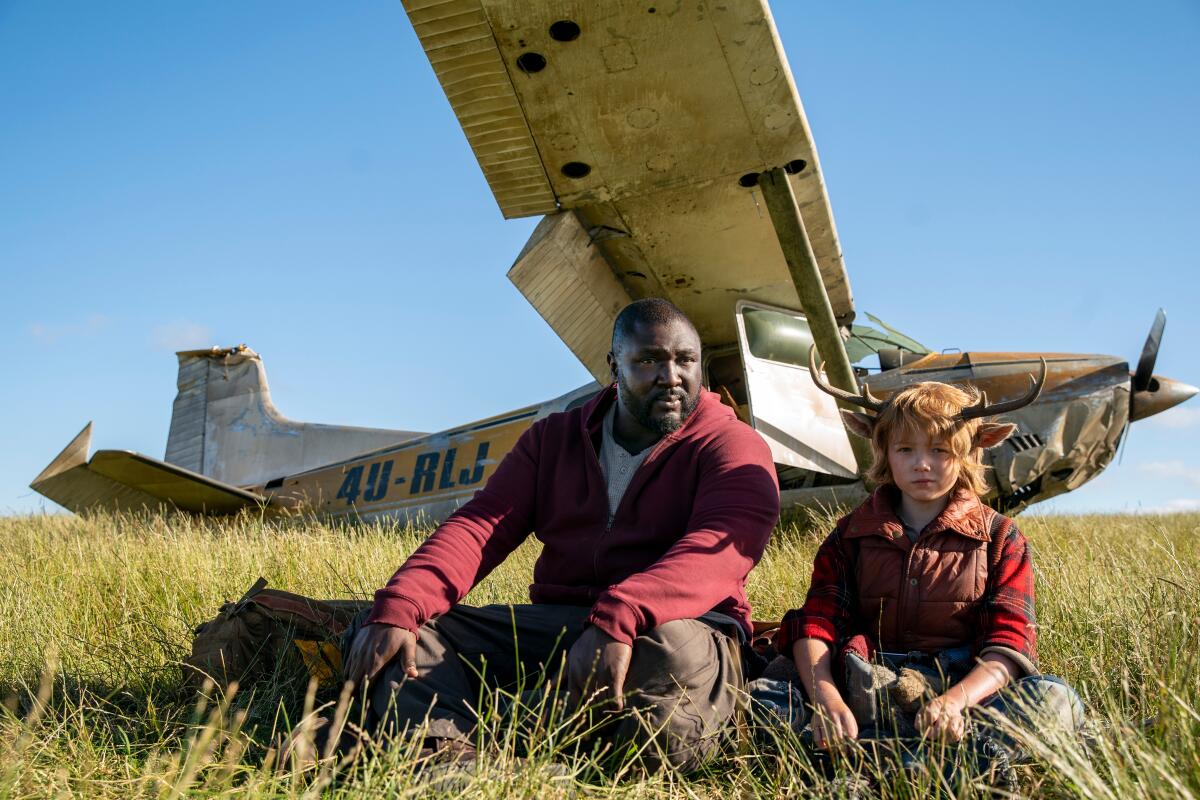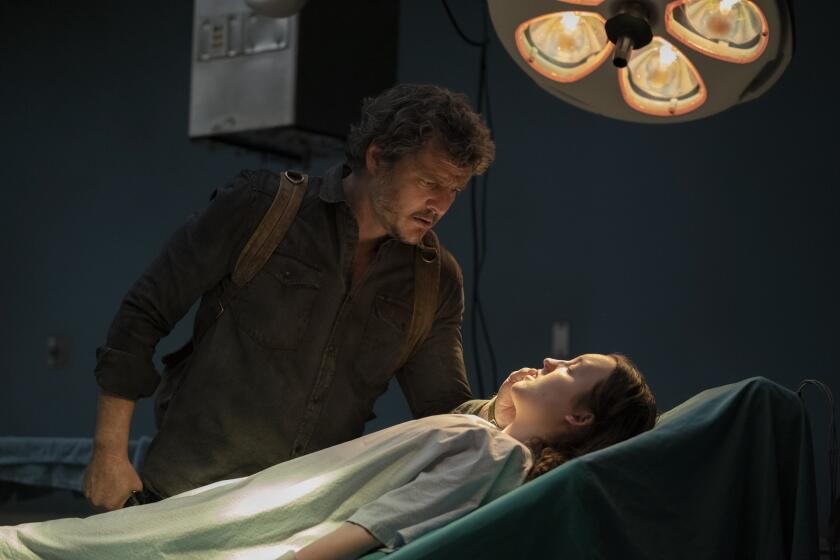These TV dads are gruff and brutally violent. Why we can’t get enough

- Share via
“Sweet Tooth” is the story of a very special, deer-human hybrid boy and the gruff Big Man who will do anything to protect him.
In the second season of Netflix’s post-apocalyptic fantasy series, young Gus (Christian Convery) has been captured by a narcissistic warlord who hunts hybrid kids. But neither a gunshot wound, nor having to make morally questionable decisions or even a well-stocked army is going to keep Tommy Jepperd (Nonso Anozie) away.
Their dynamic is one that has become increasingly prominent on TV since “Sweet Tooth” first premiered in 2021. Based on the DC comic book series of the same name, the story is set in a world where a mysterious plague has ravaged humanity.
Jepperd is introduced as a bit of a lone wolf whose emotional distance is at least in part due to his tragic past. He starts off as Gus’ reluctant chaperone on a cross-country journey, only to eventually grow fiercely protective of “his kid.” It’s eventually revealed that Gus is unlike other hybrid kids, and he might be the key to a cure to the deadly sickness that has wiped out much of the world.
Critics and audiences are divided on the season finale of “The Last of Us.” Our writers explain how HBO’s adaptation differs from the video game and how to feel about Joel’s decisions.
It’s a type of odd couple pairing that allows for Jepperd to be brutally violent — he’s a capable gunslinger and a savage brawler — while eventually showing glimpses of a softer, more nurturing side. He’s by no means tender, but Jepperd is protective and tries to teach Gus lessons that will help him survive in their world. Jepperd both reinforces and subverts traditional expectations of masculinity and fatherhood.
The “Sweet Tooth” setup might sound familiar to those who have watched HBO’s “The Last of Us.” In that post-apocalyptic drama, a mysterious fungal outbreak has decimated humanity. A series of events leads to the rough-around-the-edges Joel (Pedro Pascal) becoming the reluctant chaperone of Ellie (Bella Ramsey), a tough teen who has survived her own share of tragedy, on a cross-country journey. The Season 1 finale saw Joel — whose daughter was killed during the chaos of the outbreak — wipe out an entire militia base in order to keep Ellie alive.

And “The Last of Us” is often compared to another Pascal-led show, “The Mandalorian.” The Disney+ “Star Wars” series follows the adventures of a bounty hunter with few words and his special young ward, Grogu. Though the only plague involved in “The Mandalorian” (so far) is the persistence of an overthrown fascist regime, Din Djarin (Pascal) similarly evolves from Grogu’s reluctant travel companion into a fiercely protective dad. The Season 3 finale of “The Mandalorian” even makes it official: Grogu is formally adopted and becomes Din Grogu.
These gruff, protective TV dads are a stark contrast to one of the most pervasive archetypes of the medium: the lovably incompetent dads most often seen in sitcoms. These sitcom dads are inept man children who can’t be expected to do much other than drink with buddies and watch TV — but they generally care about their kids and somehow scrape by on their charm (and an incredibly patient spouse).
Though there are many variations, the most recognizable dad of this mold is Homer, the patriarch on “The Simpsons.” These dads also subvert what is traditionally associated with masculinity and fatherhood, just not in any aspirational way.
Television, of course, is a reflection of our times. The inept sitcom dads came about in an era when society was increasingly pushing back against the traditional father figure idealized in “the good ol’ days”: the dependable breadwinner with a solid moral center and a sense of duty who tends to be firm with his children.
Now the pendulum appears to be swinging back from these “soft” TV dads. There is the cunning, egocentric, ambitious, successful patriarch like Logan Roy (R.I.P.) in “Succession,” who is far from an ideal father. Others like Tywin Lannister in “Game of Thrones” and even George Bluth Sr. in “Arrested Development” appear cut from a similar cloth. There are also the TV dads willing to do whatever it takes to support their family, like Walter White in “Breaking Bad,” who eventually gets so deep into the drug business, he does more harm than good.
But among the most popular alternative lately on TV appears to be the capable gruff loner turned surrogate dads like Jepperd, Joel and Din Djarin. These dads are hypermasculine and capable not only of extreme violence, but also of protecting and providing for their young charges. They are nurturing and vulnerable because they care for their kids, but that doesn’t take away from their brutish masculinity. They are almost a counterpart to the “badass women” — fighters who protect the vulnerable — in film and TV who are only as tough and formidable as they are (conventionally) sexually desirable. So these dads may be subversive, but they also perpetuate some problematic stereotypes.
These father figures are not a new phenomenon — there have been shades of the type in movies (2019’s “Logan”), books (“The Witcher” and “Lone Wolf and Cub”) and games (“The Last of Us” and “God of War”). These stories likely have a wide appeal because it allows the audience to relate to the protector dad or the child.

But these gruff protector dads have become increasingly resonant on TV at a time when the idea of protecting children has become more politicized than ever. Right-wing politicians and activists, including conservative parents, are on a crusade, as they see it, to protect children by banning books by and about people of color or those that involve LGBTQ+ people and storylines. They demand that educators steer clear from teaching history that accurately acknowledges America’s legacy of racism and white supremacy. Not to mention the anti-LGBTQ+ legislation being passed or proposed by state legislatures that targets queer and trans people, including kids.
Authoritarian forces are also in play in “The Last of Us,” “The Mandalorian” and “Sweet Tooth.” The first step of Joel and Ellie’s journey involves breaking out of a quarantine zone controlled by an oppressive militarized government. The Mandalorian has had to rescue Grogu from operatives trying to restore the power of the fallen, fascist Empire more than once. And Jepperd, who once worked as a hunter for a despotic militia, is desperate to rescue Gus (and his fellow hybrid kids) from his former boss.
Parents on either side of the political spectrum can likely understand the impulse to protect their child at all costs in a world that seems increasingly dangerous due to a pandemic, the prevalence of gun violence and aggressive proponents of extremist views. And children, especially those whose identities have become topics of debate rather than an aspect of their humanity, can probably use more protectors who see them as they are and will do whatever it takes to save them. These gruff TV dads both feel like who we want to be and who we want on our side.
The politics of these shows, though, can’t be ignored. Gus, Ellie and Grogu are all “different” and special in their respective shows. Gus is revealed to be the first hybrid kid and a miracle baby created in a lab. Ellie is the only person with immunity to the mutant fungus that caused a pandemic. Grogu is a youngling who is strong in the Force. They’re all of particular scientific interests for these reasons. And “Sweet Tooth” is especially resonant because Gus and the hybrid kids live in a world that hates or fears them just for being who they are.
But Gus, Ellie and Grogu are also just kids. They deserve to live as kids and not have to worry about hunters or morally suspect scientists or power-hungry warlords or the weight of saving the world. Their gruff protector dads each see them and love them as their kids — nothing more, nothing less. And that’s probably why we can’t help but love them right now.
‘The Last of Us’
Where: HBO Max
When: Any time
Rating: TV-MA (may be unsuitable for children under the age of 17)
‘Sweet Tooth’
Where: Netflix
When: Any time
Rating: TV-14 (may be unsuitable for children under the age of 14 with advisories for smoking, fear and coarse language)
‘The Mandalorian’
Where: Disney+
When: Any time
Rating: TV-14 (may be unsuitable for children under the age of 14)
More to Read
The complete guide to home viewing
Get Screen Gab for everything about the TV shows and streaming movies everyone’s talking about.
You may occasionally receive promotional content from the Los Angeles Times.








